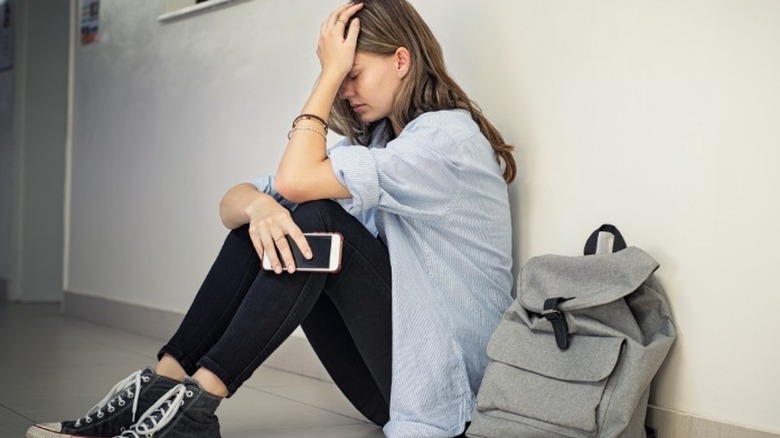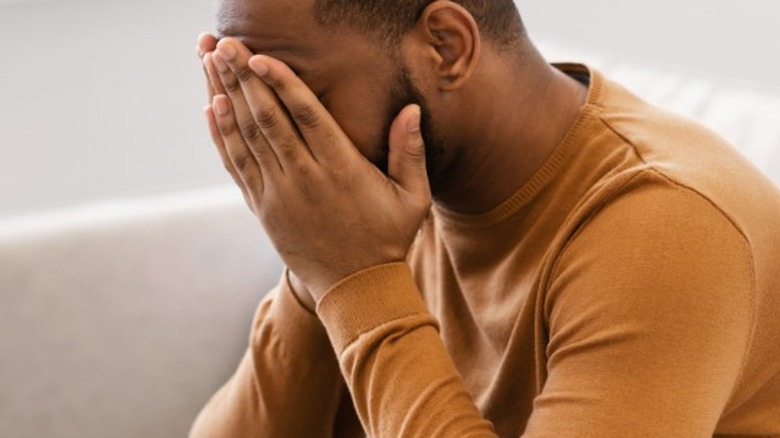How Failed Friendships Impact Your Health
Meaningful friendships play an important role in a person's overall health, as explained by Medical News Today. Because humans are inherently social creatures, people tend to thrive when they are connected to others. Evolution has led humans to create these networks with others to improve the likelihood of survival by working together, sharing food, and providing protection in numbers.
Beyond our primal survival needs, friendships can be beneficial in many ways. The Mayo Clinic shares that good friendships can boost happiness, reduce stress, increase a person's sense of purpose and feeling of belonging, improve confidence, and provide support during traumatic times. Having solid social connections can also lower your risk of developing health issues like depression and obesity.
With such a strong need to create and maintain connections that benefit your health, it's no surprise that failed friendships can have a significant and opposite impact on a person's well-being. According to Psychology Today, the loss of a friendship is profoundly painful — even comparable to the hurt felt after a romantic breakup. An article in Time adds that the ending of a friendship often doesn't have a particular moment of closure, which leaves people feeling prolonged grief.
So, how does the pain and trauma of a failed friendship affect a person's health? Here are some ways your well-being may be impacted when a friendship fizzles out.
Social isolation
The dissolution of a close friendship may change your social life, especially if that friend shared similar interests or the same social circles. As noted in a Time article, a failed friendship can cause feelings of anxiety connected to seeing that person and knowing other friends may have to pick a side. If you're trying to avoid that individual or your mutual friends, you may feel cut off from social networks, which can lead to social isolation and loneliness. People can also start to feel isolated because they keep their friendship struggles to themselves out of shame rather than asking for guidance from others.
According to a review published in the American Journal of Lifestyle Medicine, a lack of social connections can negatively affect your health and possibly increase your risk of death at a younger age. Additionally, an article in the Society for Research in Child Development shows a link between children with adjustment problems and social isolation. The research confirms that friendships protect children from the negative effects of isolation.
In older adults, social isolation can actually lead to serious health issues, including dementia, heart disease, stroke, depression, and anxiety, according to the Centers for Disease Control and Prevention (CDC). The CDC adds that building quality social connections can help adults over 50 live longer lives.
Depression
The breakup of a friendship can be extremely painful and leave you dealing with feelings of depression, including worthlessness and hopelessness, according to Psychology Today. While it is a mood disorder and mental health issue, depression can manifest itself in many ways that could have significant effects on your health (via The Mayo Clinic).
The American Psychiatry Association shares that the common symptoms of depression are ongoing feelings of intense sadness and guilt, a loss of interest in previously enjoyed activities, issues with sleeping and appetite, trouble focusing, reduced energy levels, and thoughts of suicide. When these symptoms persist for more than two weeks and affect the way you function on a daily basis, it's likely that you're experiencing depression rather than a temporary dip in your mood.
If you recently experienced the loss of a friendship and think you may be suffering from depressive disorder, the good news is that depression is treatable. Consider talking to a mental health professional and seeking support from family and friends. You may benefit from different therapies prescribed to you, such as counseling or medication.
If you or someone you know needs help with mental health, please contact the Crisis Text Line by texting HOME to 741741, call the National Alliance on Mental Illness helpline at 1-800-950-NAMI (6264), or visit the National Institute of Mental Health website.
Heart issues
A lost friendship can potentially leave you with a very real broken heart. As explained by The Mayo Clinic, broken heart syndrome is a condition caused by intense stress or an emotional event that can mimic the symptoms of a heart attack. Also known as stress cardiomyopathy, you may experience chest pain and shortness of breath as the heart temporarily changes the way it pumps blood in response to extreme emotions.
An increase in stress hormones like adrenaline and epinephrine after an emotional trauma can impact the way your heart functions (via Jefferson Health). In the case of a failed friendship, it's possible that an emotionally-packed argument led to the end of the relationship. For some people, that could be a trigger for symptoms of broken heart syndrome that may lead to complications like low blood pressure, irregular heartbeats or arrhythmias, fluid in the lungs, and blood clots (per The Mayo Clinic).
However, it's crucial to understand that chest pain and difficulty breathing are also symptoms of a heart attack. If you experience these feelings, it's very possible that you're suffering from blocked arteries that are reducing blood flow to your heart (via Jefferson Health). Seek medical assistance immediately to get the right diagnosis and treatment.
Reduced motivation
Breaking up with a close friend can lead to a devastating mix of painful emotions, as explained by Psychology Today. These low feelings and moods are much like grief, which can have physical effects on the body. In an interview with Romper about losing friends, Dr. Maryann W. Mathai, LPCC, NCC, says, "The physical impact of heartbreak is tremendous. It can create exhaustion, lack of sleep or too much sleep, loss of appetite and motivation, and bouts of crying." The article goes on to share that a failed friendship can cause waves of fatigue and not wanting to get out of bed.
Also, a lack of motivation is a common symptom of depression, which can happen after a friendship breakup (via Psychology Today). According to Healthline, low motivation and energy levels connected to depression can make even the simplest tasks feel overwhelming. However, setting manageable goals and taking small steps towards those goals can help you overcome some of these effects.
Substance abuse
The end of a friendship can be stressful for many people. According to Medical News Today, friendships tend to provide individuals with the ability to adapt to stress and deal with feelings of anxiety. Without that support, the stress of a failed friendship can actually put you at a higher risk of developing an addiction or relapsing if you've had previous issues with substance abuse, as shared in an article published in the Annals of the New York Academy of Sciences.
Additionally, feelings of social rejection or exclusion can be triggering and result in depression and substance abuse, especially for those who experience chronic rejection (via the American Psychological Association). Resources to Recover adds that loneliness is another risk factor for developing harmful coping mechanisms, including excessive use of hard drugs and an increase in a person's consumption of legal addictive substances. Loneliness and social isolation are things you may struggle with after the dissolution of a friendship (via Time).
Addiction and substance use disorder can cause several unhealthy or problematic behaviors, such as issues at work or school, financial struggles, changes in personality and appearance, and physical health problems (via The Mayo Clinic).
If you or anyone you know needs help with addiction issues, help is available. Visit the Substance Abuse and Mental Health Services Administration website or contact SAMHSA's National Helpline at 1-800-662-HELP (4357).
Lowered self-esteem
While there are several resources and available support for people who have gone through a divorce or breakup of a romantic relationship, there seems to be notably less for friendships ending. In an article published by The Guardian, Patti Miller, author of "True Friends," explains that there are feelings of shame, embarrassment, and failure connected to lost friendships that can make you feel unworthy. These feelings can make it difficult to discuss friendship breakups as openly as you might a romantic breakup.
Psychology Today also mentions that it's common to judge yourself harshly after losing a close friendship. Some people will blame themselves for the ending of the friendship. Others will carry feelings of self-loathing and confusion, especially when there was no particular reason given as to why the friendship was cut off by the other person. All these negative feelings can take a toll on your self-esteem.
Conversely, the American Psychological Association (APA) shares that having close friends and building relationships can boost your self-esteem. The social acceptance and support found in friendships have a positive influence on self-esteem. Interestingly, research published in the Journal of Personality and Social Psychology also showed that having a high self-esteem can help people establish more meaningful connections, resulting in a cycle of strong friendships and positive self-worth that feed each other.
Sleep issues
When a friendship doesn't work out, the loss of that relationship can be experienced much like grief (via What's Your Grief). In fact, it can be a lot more complex than grief after a person passes away. When a person dies, the end of that friendship is a secondary loss to the actual loss caused by the death of a loved one. However, when a friend is still living and you lose that connection, that grief can be ambiguous and confusing.
Suffering from grief after a failed friendship can lead to several issues, including problems falling asleep or getting good quality sleep. According to the Sleep Foundation, people who are dealing with grief often experience long wake periods throughout the night and find themselves lying awake in bed when they should be asleep.
Not getting enough sleep is connected to several problems that can affect your health (via Healthline). You may have trouble concentrating or problem-solving. It's also common for people to gain weight, experience mood changes, and have lowered libido. You may also increase your risk of heart disease, diabetes, and high blood pressure when you don't get the recommended amount of sleep.
Cognitive issues
Cognitive issues, such as trouble focusing and making decisions, can happen after a friendship ends. This occurs because a failed friendship may result in a type of ambiguous grief often linked to estrangement and other types of separation (via Cleveland Clinic). When a friendship is unresolved and you're left with unanswered questions regarding why your friend chose to sever connections, it's possible to experience this type of ambiguous grief, which some healthcare professionals consider to be complicated grief.
While grief can affect individuals differently, many people dealing with grief notice they have issues focusing and getting things done, as explained by Speaking Grief. Other cognitive effects connected to grief may include confusion, forgetfulness, issues with processing information, and a skewed perception of time. Also, a study published in Gerontology found that those suffering from grief performed poorly when tested for attention, verbal communication, and the ability to quickly process information.
According to the American Brain Foundation, grief-induced cognitive issues related to stress and loss are reversible. However, it's important to process the grief and work through the traumatic experience to make progress and start to heal the brain.
Changes in weight
When mourning the loss of a once strong friendship, it's not uncommon to experience symptoms of depression and grief as you struggle with your mental health (via Psychology Today). Lost friendships can be even more painful than losing a love relationship, so you often have to cope with the stress and anxiety of the failed friendship much like you would a romantic disconnection.
Many of the negative effects of a lost friendship can lead to changes in appetite and weight. For one, grief has been linked to shifts in a person's body mass index (BMI). A study in PLoS One found that different types of losses caused either an increase or decrease in BMI. Also, feelings of depression when a friendship fails can cause decreased appetite and unintentional weight loss (via Healthline).
Other depression symptoms can impact a person's weight. For example, you may have enjoyed cooking as a hobby, but low energy levels and disinterest in previously enjoyed activities as a result of depression could mean you don't cook and eat as much. Moreover, gastrointestinal issues connected to depressive disorder, anxiety, or stress may impact your food intake and weight (via Harvard Health Publishing).
Weakened immune system
The time following a friendship breakup can be incredibly difficult. According to Psychology Today, it's likely that you'll experience feelings of sadness and worthlessness associated with depression after you end a friendship. You may also suffer from anxiety and stress as you try to navigate your way through ambiguous grief that often comes with the ending of a close relationship (per Cleveland Clinic). Unfortunately, emotional distress and mental health issues like these can have physical effects on your health.
A study published in Translational Psychiatry found that depressive disorders caused functional changes in the immune cells of the body. Medical News Today adds that people who are suffering from grief can experience reduced antibodies to fight infections and issues with the way the genes in immune cells are expressed. When you combine these immunity challenges, research shows that grief and depression can have a negative impact on the immune system.
Moreover, several studies have shown that grief increases inflammation in the body (via WebMD). Inflammation can have significant effects on the immune system and may cause any health conditions you already have to worsen.
Suicidal thoughts
While the loss of a friendship can lead to depressive disorders (via Psychology Today), people experience symptoms of depression differently. According to Medical News Today, some individuals may experience feelings of hopelessness and low self-esteem. Others could have more physical symptoms, including headaches, nausea, and difficulty sleeping.
However, in more severe cases of depression, it's possible to have thoughts of death and suicide. As explained by the U.S. Department of Health & Human Services (HHS), major depression can increase the risk of dying by suicide. These numbers increase in people who have previously been treated for depression or attempted suicide before. The HHS also shares that about 60% of those who committed suicide were reported to have some type of mood disorder, including depression.
If you recently ended a meaningful friendship and are struggling with depression as a result of the loss, it's crucial to get the help and support you need to diagnose and treat the disorder. A mental health professional can provide different therapies and treatment plans that will help you cope with your depression.
If you or anyone you know is having suicidal thoughts, please call the National Suicide Prevention Lifeline by dialing 988 or by calling 1-800-273-TALK (8255).
Identifying and ending toxic relationships
While understanding the effects of a failed friendship are important to moving forward and staying healthy, knowing when to cut off a toxic friendship and doing it the right way are also vital to your overall well-being, as explained by Psychology Today. When you've built a friendship with a toxic person, it can take a while to realize they are affecting your mental health. However, over time, the negative effects can include anxiety and compromised self-worth.
According to the Huffington Post, some signs that it may be time to end a friendship may include a noticeable imbalance in how much time and energy you give to this friend. If your friend demands your support and attention but does not reciprocate those qualities, it's a red flag. Also, you should feel excited to see your friend and want to hang out. When those feelings turn to exhaustion, worry, or apprehension, it may be time to reevaluate your relationship.
Although ending a friendship can be daunting, approaching it with sensitivity and resolve can help you get through it. WebMD suggests giving yourself some space. During this time away from this toxic friend, accept that your feelings are valid, then share them with this person. Do your best to focus on your feelings rather than their actions to help them understand the toll the toxic relationship has taken on you. Then, seek support and take the time to heal.













